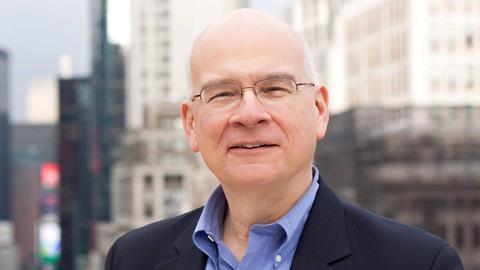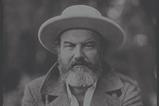Ranked as one of America’s most influential Christians and with a ministry reaching sceptics from Manhattan to Mumbai, Tim Keller talks to Justin Brierley about inspiring a new generation of intellectually engaged evangelicals

I’m not the first person to draw comparisons between Tim Keller and CS Lewis, but when I mention it to the New York pastor himself, he almost falls over himself to downplay the similarities. While acknowledging a debt of inspiration to the British author, he insists that it is ‘silly’ to equate his work with the apologetic genius of Lewis, and that such comparisons owe more to overenthusiastic book cover publicity than reality.
Despite his protestations, I’m still inclined to see the resemblance. Keller is an intellectually compelling preacher and author with a similar ability to Lewis to help thinking people, including the sceptical, to understand and embrace Christianity. There are differences, of course. Unlike the bookish Oxford don, Keller is an urbane and culturally savvy communicator, as evidenced by the growth of Redeemer Presbyterian Church, which he founded in New York after moving to the city with his wife Kathy and their three children in 1989.
As well as drawing large crowds to downtown Manhattan, Keller’s stock has risen dramatically around the world in the last decade. When Oxford University hosted a major student mission, Keller was the natural choice to speak to a young generation of intellectual enquirers. When John Stott passed away, Keller was the person asked to deliver the eulogy at the US memorial.
Keller particularly came to public attention for his breakthrough book The Reason for God (Hodder & Stoughton), which provided an accessible case for Christianity at a time when Richard Dawkins and his fellow atheists were riding high in the best-seller charts. Answering the most common objections raised by sceptics who visited his Manhattan church it (again) invited comparisons with CS Lewis’ Mere Christianity. His latest book, Walking with God Through Pain and Suffering (Hodder & Stoughton), could also equally be seen as an homage to Lewis’ apologetic classic The Problem of Pain.
The book came during a difficult year in his own life – both of Keller’s parents passed away while it was being written, an experience he modestly describes as the ‘garden variety’ of suffering. He acknowledges that the book is aimed at people who have suffered more extreme forms of pain, such as those in his own congregation who lost loved ones when the Twin Towers fell on 9/11.
On the Sunday after the attack, thousands of people tried to cram into Redeemer’s services. Many of the young urbanites who came that day, looking for meaning in the midst of tragedy, stayed. Today there are still more than 5,000 in weekly attendance.
There is nothing overstated about the formula of the church – it is devoid of a rock band or complex visuals – but at its heart is a culturally relevant message delivered by Keller from week to week. Unafraid to engage the intellectual faculties of his audience (Keller is just as likely to quote Albert Camus as St Paul), he effortlessly connects the cosmopolitan culture of New York with historic Christianity. The preacher is unapologetic about his target audience – the movers and shakers who attend his services are the ones who can bring change at the heart of the city.
When it comes to theology, Keller is a Calvinist, albeit a slightly reluctant one. He tries to steer clear of labels where possible, describing his view simply as ‘orthodox’ Christianity. Nonetheless, he is one of the key figures of the so-called New Calvinism (though at 64 he happily admits that he is less ‘young and restless’ than its other well known leaders such as Mark Driscoll). Along with Don Carson, Keller established The Gospel Coalition in an attempt to draw together the various networks that the resurgence of reformed theology had created, and offer a voice of experience to some of its younger protagonists.
However he defines himself, Keller’s theological colours are at their most visibly predestined when he offers an explanation for the success of his 25-year ministry. ‘It is only with the help of the Holy Spirit,’ says Keller. ‘The number of people who actually feel the force of it and then actually let that draw them toward Christ is something that I have no control over.’
When did you know that you were a Christian?
I was raised in a Lutheran church and was confirmed when I was 14. In college I embraced the idea (which is an evangelical idea) that simply being baptised and confirmed into the church wasn’t enough and I needed to have a living relationship.
How did that happen?
This was 1969 – I was taken to Intervarsity Fellowship meetings. I was exposed to the writings that they filled their book tables with: John Stott, Packer, Martin Lloyd Jones… those folk. Basically I saw problems I was having in my own life as a young man. ‘Who am I? What’s my meaning in life?’ The way in which those writers talked about sin and grace convicted me that I was a sinner and that I needed grace. I would say there were a couple of months where I actually passed from not believing to believing.
Did those authors influence your commitment to Calvinist theology?
Yes, it was settled early on. There were almost no books written for college educated conservative evangelicals by Americans back then, so you had to read British authors. When I went to seminary I was taught by Dr Roger Nicole, a French-Swiss professor of theology, a marvellous teacher and a marvellous man. He was reformed and a Calvinist and that’s where I learned my theology.
When you started in New York, did you envisage having thousands in attendance across multiple locations?
That’s an easy answer: No!
What were your expectations?
Survival. You hope that you will be able to gather, frankly, enough people so that their giving covers your salary and living expenses. You want enough people to find faith and be growing in their faith inside the congregation to justify having the ministry. So I honestly had no more of a goal than that.
What sparked the tremendous growth over the years?
New York is a place where people are under a lot of pressure and stress. Compared to the rest of the country it’s a rather secular place, much more recognisable to Europeans and British people than the rest of the United States. God was helpful to me in finding a way to communicate the gospel without compromising it, but connect it to aspirations and fears and baseline personal and cultural narratives.
You find out whatever the culture or person is looking to for meaning, and you show that while that is a good thing, you’ve turned it into an idol and only in Jesus Christ will that aspiration ever be fulfilled. That’s basically how you preach. But on the other hand, how effective you’re going to be is absolutely up to the Holy Spirit. Whether you have three or four converts a year or you have 1,000, it’s nothing to do with your programming, I don’t think. Nevertheless, you seem to have a particular gift for connecting with the intellectual curiosity and urban culture of New York... Well, yes, that’s right. People who come here are experts in their field, they want to know that if you’re telling me something about an ancient text that you’re an expert in that, or that you’re reading what I’m reading. But I have definitely seen other people make that uncompromising yet cultural connection to a culture and it not have anything like the fruit I’ve seen here. And I think that’s just because God wanted to break something open here 25 years ago to do other things, and he has the right to do that.
TV news presenter Kirsten Powers says she held evangelical Christianity ‘in contempt’ before she came to faith through Redeemer. What’s persuading urban sceptics like her to connect with God?
There are a lot of other folks like that; people who were surprised at how a conservative Christian theology was relevant to the things they were going through.
Everybody has got a story. If you’re able to inhabit that so well that [people] feel that you know their story better than they do, and then show in a compelling way how that story is only going to find resolution in Jesus, then they are going to find a compelling case for Christianity.
By the way, again, it is only with the help of the Holy Spirit. I’ve seen plenty of people say, ‘That’s the most persuasive presentation I’ve ever heard, but I’m not even going to touch it.’ The number of people who actually let that draw them toward Christ is something that I have no control over. You’re beginning to see my Calvinism coming out. Don’t push me! I’m getting Calvinistic on you!
You’ve been influential on many UK church leaders. What do you make of the church scene from your visits here?
PEOPLE WERE SURPRISED AT HOW A CONSERVATIVE CHRISTIAN THEOLOGY WAS RELEVANT TO THE THINGS THEY WERE GOING THROUGH
It’s as fragmented as every other country’s Christian world. I don’t think it’s worse or better, actually. One of the advantages of bringing an American speaker to the UK is that the tribalism is broken down a little bit. A foreign speaker doesn’t completely fit in any one tribe and you draw a broader crowd.
Does the ‘tribalism’ concern you?
Of course, but I really don’t see a country anywhere that they’ve broken through that. One of the things that is interesting about the UK is because the Church is smaller than the American Church is, it sometimes feels a little bit more combative over there. Because you’re smaller you kind of know each other better. Over here the tribes are so big we’re almost oblivious to the existence of other tribes.
Walking with God Through Pain and Suffering tackles the problem of pain. Have you been through any personal dark nights of the soul when it comes to suffering?
My wife Kathy has Crohn’s disease and she has lost some rather large parts of her body, her colon and things like that are taken out. She’s doing rather better now but it could come back anywhere at any time. She was extraordinarily sick for four or five years and we didn’t know if she was going to live at certain points. It was so draining on me that I actually thought about leaving the ministry.
The reason it was a dark night was because my wife is my best friend and we always decided that we weren’t going to talk about intimate things with other people without talking to each other. However, I thought I just couldn’t tell her because it would destroy her if she felt that she was doing that to me. But I also didn’t feel quite free to talk to other people about it, because I couldn’t leave her out of the loop. So, I had a horrible year.
When you are caring for suffering people, I actually found that the caregivers of the sufferers are suffering too. It’s second-hand suffering, sort of like second-hand smoke. Nobody sees it as suffering, and yet they are going through something that is just awful, and yet generally nobody is helping them.
What do you say to those with a health, wealth and prosperity message – who use certain verses in scripture as promises of a life free from suffering?
I remember that years ago I figured out that if you go to Proverbs it seems like the first five chapters after chapter 10 seem to be saying that ‘if you do this then everything will go well. If you love people, people will love you; if you work hard you’ll always be prosperous’. And they seem to be categorical statements. But they’re not, they’re proverbs. A proverb is not a promise.
Then starting at around chapter 16 stuff comes in where it says things like, ‘The poor work hard, but oppression takes it away.’ To the naïve reader of scripture it almost seems like a contradiction, so which is it? And the answer is that you haven’t learned how to read. You have to take the whole Bible in context, especially Proverbs.
I think the answer is in general that God made the world so that if you live in certain ways then generally speaking your life goes better. But the world is broken and because it’s broken those things don’t always pay off. And you have to expect that. There is suffering and evil and it’s part of the curse of the Fall. If you take certain verses out of context, you run into that problem.
Can God use suffering within his purposes?
If evil had not happened there would be no such thing as courage, there would be no such thing as sacrifice. At the same time we must not imagine a God who enjoys seeing us have pain and suffering. That’s the problem with saying that he ordains evil in the same way that he ordains good. In Ezekiel he says, ‘I don’t desire the death of a sinner.’ But there is no doubt in my mind that God allowed evil because the eventual glory will be greater than if the evil hadn’t happened. I’m Calvinistic enough to say that if I understand that, then whatever God’s purposes are, I know that the evil will only make the eventual glory even greater and therefore evil will be absolutely defeated.
So what answer do you give to someone going through suffering?
When you’re really going through it, that is actually not the time to start reading a book by some philosopher on evil. It just isn’t. You just don’t have the energy for it. Generally the question is much more, ‘How do I get through this?’ and not ‘How do I understand this?’
Once they are ready then my pastoral answer would be that the Bible gives us a God who suffers. It is both an intellectual and a very personal, even visceral, truth that in one person, in Jesus Christ, the divine and human natures were united. Therefore deity is on the cross.
The cross shows that he cares. That means that both intellectually God did come and suffer, but personally it means that he is with us. It means that he really is God with us. Emmanuel is usually what we talk about at Christmas – he’s human so he’s with us. But on the cross, boy, there’s God with us. If he hadn’t suffered, he really wasn’t with us. I think that’s very powerful.





































